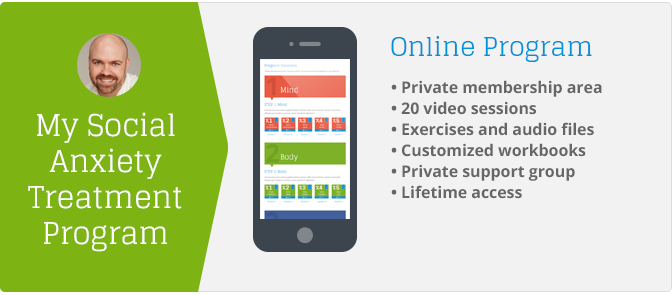How to Tell the Difference Between Social Anxiety and Shyness

Most of you will feel some shyness at some point in your life in situations that take you out of your comfort zones: job interviews, dating, going to a party where you don’t know anybody, making a difficult phone call…
However, shyness tends to affect only one of area of a person’s existence, and isn’t to be confused with Social Anxiety Disorder or Social Phobia, a condition which can blight all aspects of your human interaction. Often mistaken for extreme shyness, it may be left undiagnosed and untreated for years.
So, what is the difference between social anxiety and shyness, and what kind of help is there for you?
The difference between social anxiety disorder and shyness is that feelings and physical symptoms of nervousness will subside as “shy” people become more familiar with the situation; while if you have social anxiety, then they won’t, and symptoms may even worsen.
While shyness can evolve into social anxiety, it isn’t a natural progression, and, in fact, many people suffering from Social Anxiety don’t think of themselves as shy. To the untrained eye, they can come across as talkative and friendly, but underneath the surface, they struggle with anxiety thoughts which affect their behavior and often leave them unable to cope with social situations.
Another difference between social phobia and shyness is the intensity of the stressful feelings. Social anxiety is characterized by hyperfocus and over-analyzing: people suffering from it will either re-live past situations endlessly, often criticizing themselves, or project themselves into the future and anticipate the difficult feelings they will feel in advance, as well as being convinced that everybody will notice that they are uncomfortable and will judge them for it.
Social Anxiety Disorder is undoubtedly a real life-limiting condition, not only because of the physical symptoms it creates, but also because those who are suffering from it tend to give themselves a hard time about it, only serving to reinforce levels of anxiety. On a rational level, they know that their fear is disproportionate to the situation, but they cannot control it.
Unfortunately, because Social Anxiety is often undiagnosed, it can be left to flourish for years under the misconception that there is no way out.
But there is!
A range of treatments are now available, like behavioral therapies which have been very successful at helping people reclaim their lives by re-training their mind to think about situations and their feelings differently.
Overcoming Social Anxiety has developed a comprehensive, in-depth online program which you can join to learn strategies to help you manage social phobia. Influenced by my experience with DBT, Dialectical Behavior Therapy, and mindfulness, after the Buddhist concept of mindfulness, although in no way religious, aspects of those therapies are particularly effective at treating Social Anxiety Disorder as they teach people to focus on the present moment and put away past and future worries, which is an area they struggle with.
If you think you may be suffering from social anxiety and would like more information about my online program, then please drop me an email and I’ll let you know all about it and when it will be available to trial.
What other ways do you think you can identify shyness compared to social anxiety? I’d love to hear from you.
All the best, Kyle
Next post: Panic Attacks and Social Anxiety Disorder
Previous post: Understanding Fear – What are Phobias and How Common Are They?


